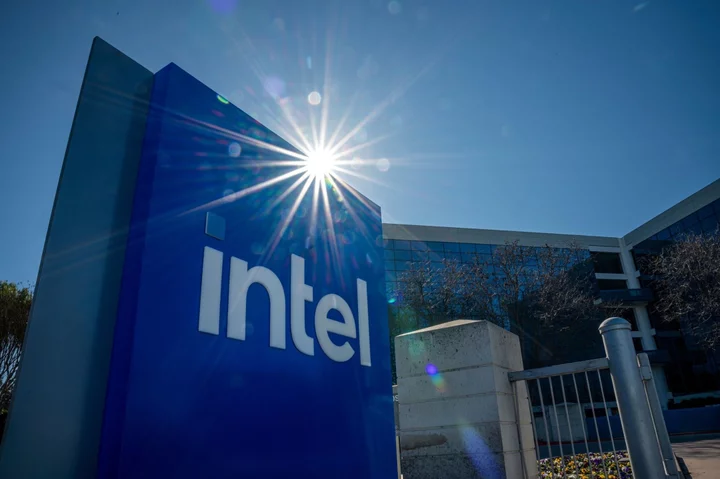Intel Corp. has agreed in principle to build a new manufacturing plant in Israel in the latest move by the US semiconductor giant to diversify its production sources.
The preliminary deal was announced by Israel’s finance ministry and Prime Minister Benjamin Netanyahu on Sunday. Intel Israel confirmed the company’s “intention to expand manufacturing capacity in Israel,” where it is already active, but didn’t specify the terms or provide other details.
The facility will be for wafer fabrication, a segment in which Israel is already one of Intel’s four major providers, according to a person familiar with the plans who wasn’t authorized to speak publicly.
While Netanyahu put the value of the deal at $25 billion, which he said was the largest foreign investment in Israel and an “expression of confidence” in the nation’s economy, the person familiar said the total included a previous, $10 billion investment announced in 2021.
Read more: Intel, Micron Spending Spree Shows Diplomacy Bearing Fruit
According to Israeli officials, the project will add thousands of jobs to the almost 12,000 workers now employed by Intel in the country. The new plant — to join an existing one in Kiryat Gat, south of Tel Aviv — is slated to begin operations by 2027 and remain active until at least 2035, the ministry said. As part of the agreement, Intel will pay a 7.5% tax rate in Israel instead of the 5% it pays now.
Sunday’s announcement caps a busy time for the chip industry. Intel on Friday announced a $4.6 billion chip facility in Wroclaw, Poland. Its competitor, Micron Technology Inc., is close to an agreement to commit at least $1 billion toward setting up a semiconductor packaging factory in India, Bloomberg News reported the same day, citing people familiar with the matter. The development plans highlight the global race to diversify supplies of critical components amid US tensions with China.
Read more: Micron Nears $1 Billion Investment in India Chip Packaging Plant
Companies are also taking advantage of subsidies from foreign governments eager to make sure the supply of chips in their own territories is safe and attracts jobs. As part of the agreement with Israel, Intel is likely to be eligible for a significant government grant representing 12.8% of its total investment.
Intel has been operating in Israel since 1974, and has R&D centers in Haifa, Jerusalem, Yakum and Petah Tikva, as well as an existing factory in Kiryat Gat, which the company calls its “most advanced manufacturing facility.” Intel’s Jerusalem facility is the global development center for Mobileye, its autonomous driving unit.
Santa Clara, California-based Intel said its intention to expand “is driven by our commitment to meeting future manufacturing needs and supporting Intel’s IDM 2.0 strategy, and we appreciate the continued support of the Israeli government.”
The strategy, unveiled in 2021, was touted as an “evolution of Intel’s integrated device manufacturing model” that would see the company become a provider of foundry capacity in the US and Europe, as well as an expanded use of external foundries for some of its products.
--With assistance from Debby Wu.
(Updates with details of new facility from third paragraph.)









